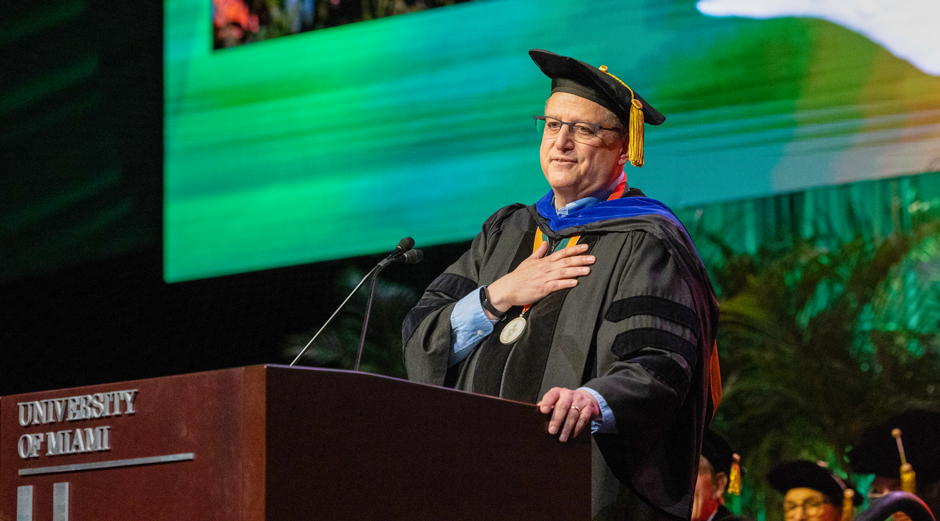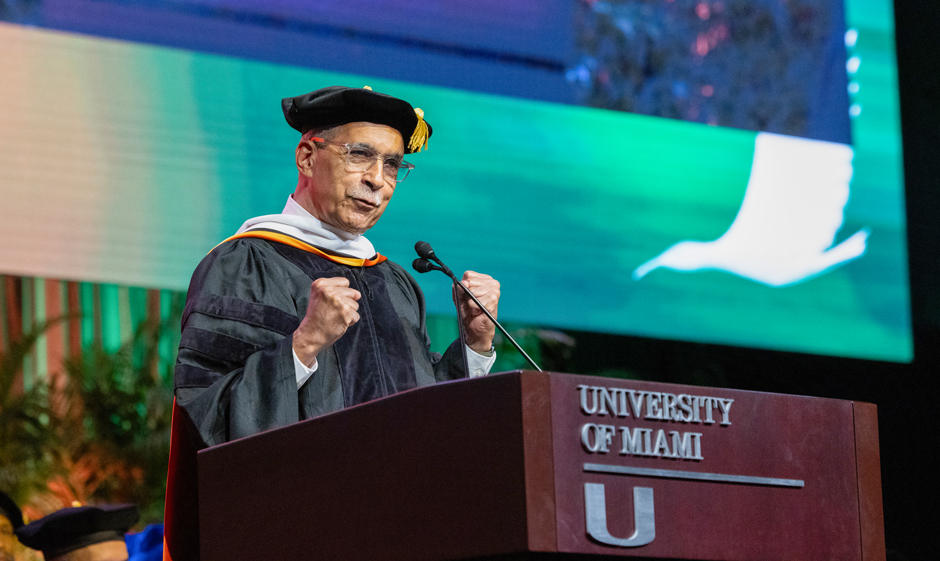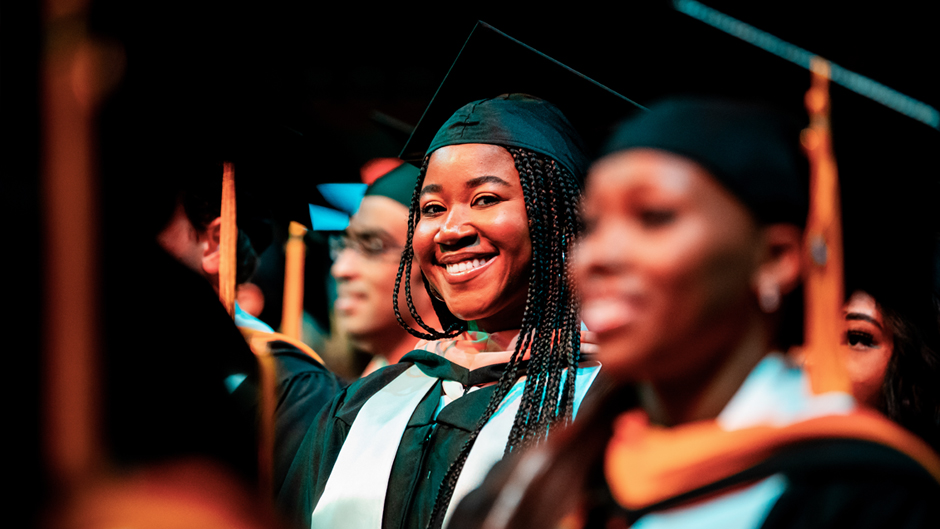A renowned atmospheric scientist and University of Miami professor who has mentored countless aspiring meteorologists, and now oversees an institute of 150 scientists who work to increase our scientific understanding of the earth's oceans and weather, gave graduates a simple but powerful message during Thursday’s first commencement ceremony.
To succeed in their careers, Ben Kirtman told graduates, they must persist despite setbacks. And be kind.
“Never underestimate the power of kindness,” said Kirtman, a professor and the William R. Middelthon III Endowed Chair of Earth Sciences at the Rosenstiel School of Marine, Atmospheric, and Earth Science. Kirtman also directs the Cooperative Institute for Marine and Atmospheric Studies, a center of excellence for the National Oceanic and Atmospheric Administration.
“The pandemic led to a lot of fear and despair—much like everybody else, my team didn’t know if their future was secure. We learned that kindness, honesty, and transparency develop trust, and this trust helped us work through the fear and despair to increase our productivity and make us even more valuable to the science mission.”
In the second commencement ceremony Thursday, Claude M. Steele, the Stanford University Lucie Stern Professor Emeritus of Psychology, noted that long-term goals and dreams of success are indeed important, yet they are outcomes on the distant horizon and should not be too central in life. From his extensive career as a social psychologist, he offered “an addendum” to taking a passion-first approach to life that can lead to imbalance and inhibit happiness.
“Put them in a drawer and focus with all your energy and intelligence on the concrete actions that are instrumental to those goals—things you can actually control,” said Steele. “Hold yourself and your self-regard accountable only to putting in the best, most thoughtful effort. Make that a habit of mind.”

On Thursday morning, close to 600 graduate students crossed the stage to earn their degrees from the Graduate School, the College of Arts and Sciences, the College of Engineering, the School of Law, the Rosenstiel School of Marine, Atmospheric, and Earth Science, the Miller School of Medicine, and the School of Nursing and Health Studies.
Kirtman quoted some of his favorite characters, including Pele, Homer Simpson, Oscar Wilde, and Winnie the Pooh, in what was his first commencement address, and told students that their failures are often more illuminating than their successes. Kirtman admitted he has made errors in his climate research and learned from those experiences. He also failed kindergarten because he couldn’t skip.
“Failure is a critical part of the path to success,” he said. “As you progress to your next challenges, please know that an important part of perseverance is not being afraid of failure. In fact, if you’re not failing some, you’re probably not taking enough risks.”
He is also a product of resilience. Regardless of his kindergarten experience, today Kirtman is considered one of the top climate modelers in the nation and helped create one of the first intergovernmental panel reports on climate change for the United Nations. It’s now considered a key document for climate resilience planning across the world.
And despite the unseemly calls he gets at times, Kirtman said kind, encouraging postcards, student interest in climate science, and research funding help motivate him to keep improving upon his models. He also truly enjoys studying the earth’s climate, and urged graduates to find a field they love.
“Be kind to yourself and avoid comparisons that suck the joy out of what you are doing,” he said. “I’m fortunate to love what I do; if you ever see someone skipping happily to work on the Rosenstiel campus, that’s me. I can skip now.”
In addition, retiring faculty members Patrick McCarthy, a professor who has taught in the Department of English at the College of Arts and Sciences for 48 years, and Pamela Reid, a professor who has taught in the Department of Marine Geosciences at the Rosenstiel School for 36 years, were both honored at the ceremony.
Student speaker Daniel Cutimanco spoke to graduates about his journey to earn his master’s in construction management from the School of Architecture. Cutimanco, a native Spanish speaker who attended college in Peru, overcame his own fears to deliver his speech. After graduation, he will be working at Coastal Construction.
“After almost a year and a half I ask myself … Who am I? This time I have the answer. I am the sacrifices of my parents and the dreams of a kid who wanted to design and build homes for those who needed them most,” he said. “Fellow graduates, dare to write your own story and conquer your fear. When life gets challenging, remember who you are: an unstoppable Miami Hurricane.”
Thursday afternoon, 736 graduates from the Graduate School, School of Architecture, the Miami Herbert Business School, the School of Communication, the School of Education and Human Development, and the Frost School of Music, received degrees.
Steele, the featured speaker, urged the graduates to “focus on making every day your masterpiece. This will calm the worry you have over getting a particular outcome, or over how successful you are in general. It will give you the psychic space to care about other people and broader issues. It will make your pursuit of your passion less narcissistic and vastly more pleasant.”

Steele attributed his theme, in part, to famed UCLA basketball coach John Wooden, whose teams in the 1960s won 10 national championships. At his new team’s first practice of the year, Wooden took off his shoes and gave some of the nation’s most sought-after young recruits a detailed explanation of how to put their socks on prior to a game or a practice.
“The coach was sending a message: If you want peace of mind as you pursue your life passion, don’t focus on the national championship but on how you put your socks on, how you exactly play the game, or what you need do next,” Steele explained.
He cited, too, a number of failed studies—such as paying students in the Houston public schools to get good grades—demonstrating how focus on goals and outcomes—the “markers of success”—are a poor substitute for the work of building strong habits that lead to success.
Steele offered advice also from his extensive research in the arena of race and ethnicity.
“Our research over the years shows that not worrying so much about how one is perceived—as a good and unbiased person, for example—and focusing instead on things that build trust between people is a vastly more effective way to surmount otherwise fraught identity differences,” Steele said.
Being curious about the people on the other side of an identity divide and taking the effort to learn about who they are and what conditions of life they face, and, as best as possible, trying to be helpful can be transformative, he noted.
“Like winning basketball games, it’s a game played on the ground through concrete, everyday actions—listening, being curious about the different experiences of people with different identities and beliefs, being responsive, and being helpful,” Steele said.
For his contributions over more than four decades as a renowned psychologist, researcher, and academic leader, Steele was awarded a degree of Doctor of Humane Letters, honoris causa, from the University.
Graduate student speaker Hannah Artman, a triple ’Cane who began her undergraduate studies 14 years ago and earned her doctorate at the ceremony, celebrated the audience of “the world’s next cutting-edge architects, public relations savants, innovative and caring community psychologists, and world-class musicians” for their commitment to the joy of learning and kindness of community.
“We have accomplished a feat that many aspire to but may never achieve, may not access, or that many may simply take for granted,” Artman said. “We said ‘no’ to the material things and instead we put the work first, we put the people first, and we believed in ourselves. That is a true success, and there is only much, much more to come.”
During seven commencement ceremonies taking place Thursday, Friday, and Saturday at the University of Miami, nearly 4,300 students are expected to earn their degrees at the Watsco Center throughout the next three days.
University President Julio Frenk on Thursday congratulated students and emphasized that he recognizes the sacrifices that many students had to make in order to attend the U, particularly during the COVID-19 pandemic. He also encouraged students to return to the University throughout their careers, particularly next year, as the institution celebrates its centennial.
“Going through these experiences while pursuing an advanced degree has given you the opportunity to learn—and practice—adaptability and resilience,” Frenk said. “No matter where your paths lead you, I can guarantee you this: You’ll continue to use those skills.”

